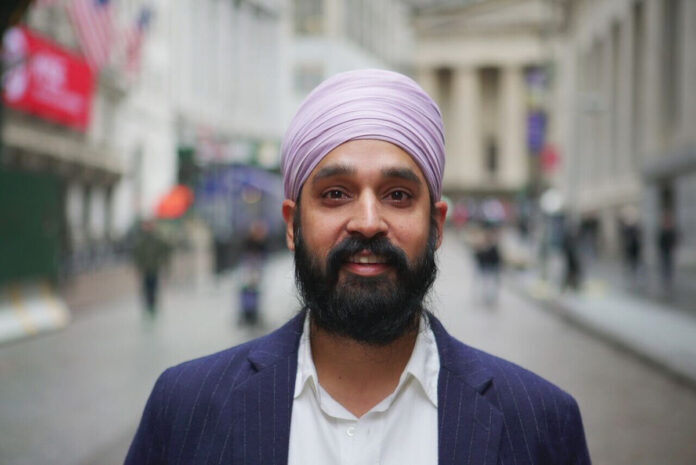On Nov. 7, the Institute for Religious and Cultural Understanding presented this year’s Wallenberg Tribute lecture and award. The Wallenberg Tribute lecture and award was conceived to honor Swedish diplomat Raoul Wallenberg who saved Budapest Jews from the Nazis during the Holocaust. The event’s speaker was New York University professor of religion Simran Jeet Singh, Ph.D. In addition to teaching, Singh is an author, activist and devout follower of Sikhism.
According to William Gruen, Ph.D., professor of religion studies at Muhlenberg and organizer of the night’s activities, the department “wanted to find a speaker who could speak to the topic of Sikhism in contemporary America.” After they chose to grant the Wallenberg Tribute Award to the Lehigh Valley Sikhs for the work they did at the height of the COVID-19 pandemic, Gruen immediately thought of Singh given that “[he] is such a prominent and well regarded speaker on Sikhism… he was the logical choice.”
Singh began his talk by discussing the adversity he and his family had to overcome as visibly Sikh individuals living in southern Texas. He specifically focused on his admiration for his father for standing by his faith.
Those that practice Sikhism are confronted with a duality in their discrimination, according to Singh. On one hand, they are highly scrutinized, standing out in a crowd due to how they present themselves through their clothing. Yet, even though Sikhs make up the world’s fifth largest religion, they are constantly overlooked in media and culture.
Singh shared his household’s mantra for when the racism they experienced became too powerful a force to ignore. “You can’t choose how people treat you, but you can always choose how you respond.”
This phrase was extremely evident in Singh’s retelling of his parents’ and the Sikh community’s response to the 9/11 terrorist attacks. Men in both the Islamic and Sikh faiths are known to wear turbans and grow out their facial hair. “People think we’re Muslim.” Singh noted that following the 9/11 attacks these similarities incited threats to the Sikh community, and his family specifically, by individuals who confused the two faiths and formed unjust generalizations about the Islamic faith.
“You can’t choose how people treat you, but you can always choose how you respond.”
However, when Singh would observe and engage in interactions surrounding this subject he noticed that “it was not about strategy. What’s the easiest thing to do? It wasn’t even about what’s the safest thing to do. It was: what is the right thing to do in this moment?”
Singh expressed the sentiments of the Sikhs around him at that time. “We’re not looking for the easy way out,” Singh stated. “We want to do the right thing here. And the community said, ‘You know what? If we say ‘it’s not us, it’s them,’ then we’re just deflecting the hate to another community. And that’s not right.’”
His speech then transitioned into a discussion of the core tenets of Sikhism: oneness, love and service. “Imagine how different our world could be if we all believed we were connected,” Singh said in reference to the quality of oneness. Born out of that connection, in Singh’s opinion, is love. Making love a constant in your life is key in Sikhism. Singh affirmed that “love is the goal of life, love is what we’re looking for.” A natural byproduct of love is service, said Singh. Singh illustrated this process by saying that, “you are moved because you love, that’s service.”
“Sikhs, though very visible in our community because of their distinctive dress, are very poorly understood by the public. This lecture served the need of educating and informing our campus community and other attendees about this vibrant group.”
Singh concluded his talk by communicating the primary purpose of his lecture. He hoped to give insight into his often overlooked culture. “To us, this is our tradition. We choose to stand out. We choose to serve. And we do it with a whole lot of love because we believe that doing so will help us feel more connected.”
The lecture was also well received by students. Matthew Klinger ‘25 noted that he “liked how [Singh] focused on love over hate. I think that’s really important in today’s polarized society.”
Gruen expressed the significance of Singh’s lecture stating that “it is important that we see the great diversity of cultural and religious groups all around us. Sikhs, though very visible in our community because of their distinctive dress, are very poorly understood by the public. This lecture served the need of educating and informing our campus community and other attendees about this vibrant group.”






















